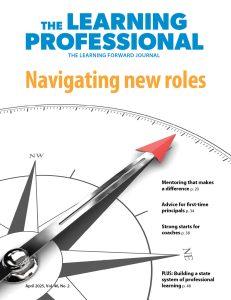Why is she coming to our team meeting again? Will she come into my classroom today? What will she say and “recommend”? I don’t need any help! All these questions and comments raced through my head as I walked into the classroom. I was fully aware of the passive aggressive behavior that my colleagues exhibited when I worked alongside them, but quickly realized how it was amplified once I was afforded the opportunity to coach teachers and teams at my school. The daily smirks and smiles burned my heart because I knew that ultimately student achievement was at stake and their indifferent behavior toward coaching was disappointing. I wanted them to see the value of having a thought partner in a coach for themselves and students, reflect on their practice, and consider how their teacher actions had a direct effect on how students exhibited their learning in the classroom as well as realize the power and impact they have on student outcomes; this feeling was not mutual. The resistance that was felt as a local school coach was real and raw and felt visceral each time I approached a coaching opportunity.
As I look back now and reflect, I know that I came to understand the mindset around a coaching culture in a school is a critical factor in the success of a coaching program. A culture which reflects that everyone deserves a coach because everyone deserves to grow, transform, and support the positive impact of student achievement is an imperative message that must be made loud and clear in order to help make shifts in teacher practice. Unfortunately, the lack of understanding of this concept was apparent in my former context, but I continued to work to help shift the mindset from fixing it to how can this be more effective? From thinking that I had to know all the answers to let’s look at the evidence together and learn. Too often the role of a coach leaves much to be interpreted by leaders, teachers, and the coach. When this obscurity is apparent, the role of the coach is misunderstood and misconstrued by the faculty.
I continued to work to shift the mindset from thinking I had to know all the answers to let's look at the evidence together and learn. Share on X“Coaching done well may be the most effective intervention designed for human performance.” This quote from Atul Ganwande resonates with me in that it epitomizes the impact that coaching can have on improving teacher and student performance when “effectively designed.” Every day, educators work with young minds in helping them find and reach their best selves.
Teachers deserve the same opportunity. Coaching teachers is one of the most effective forms of job-embedded professional learning that provides them the time and space to pause and reflect on their classroom practices by examining student evidence, decisions on teacher practice, and support them in making the right decisions in the best interests of their students. Very often teachers feel that they are running around a hamster wheel trying to solve the same issues they have about their student academic difficulties year after year. An instructional coach can and should be leveraged to support teachers in identifying areas of growth, working with them to strategize the best way to improve their classroom practice, and reflect on their growth as a professional by engaging in focused and meaningful conversations.
When coaching is utilized in its truest form, the coach works to develop a plan with the teacher based on student and teacher needs and engages in a cycle of goal-setting, inquiry, and improvement which is grounded in partnership and trust. Teachers will resist when coaching is done “to them” versus it being done “for them.”
At one school I supported, coaching was presented in a growth mindset manner where everyone in the building worked with a coach regardless of tenure, degree status, or how they performed on their evaluations. It was an expectation set forth by the leader that teachers modeled being a lead learner for their students by exhibiting that they are learners themselves. The leader in the building was transparent to her staff that she had a coach as well. In that culture, the coaches were partners with the teachers through the cycles, celebrated their growth, and had data-driven conversations that exposed pedagogical gaps in a respectful manner that then become the basis for the coaching cycle.
Conversely, coaching can also be depicted as a practice or form of development provided to teachers that are in need to be “fixed” due to pedagogical gaps that administrators may see when conducting observations. In this example, coaches are assigned to teachers as part of a professional development plan or follow up after an administrator has seen something in a teacher’s classroom that they do not deem as proficient. The teacher is then referred to the coach and a coaching cycle begins in the area of need. In this example, the coach and teacher may not have a relationship and the coach is often viewed to the teacher as the expert that will come in to fix the “problem” that is happening in the classroom. Furthermore, in this scenario, the coach/coachee relationship can lack partnership and trust, which likely results in the teacher being compliant through the cycle, but little to no shifts in teacher practice.
When coaching is meted out to fix deficits or when common language is not established, the true impact and power of coaching is diminished and vague understanding of coaching is perpetuated. When all stakeholders in the system hold a vision that coaching is about improving student achievement by examining the effect of teacher actions on student actions through a learning growth mindset, it is only then that an authentic coaching culture can blossom and have a sustained impact on schools and the larger school system. Ultimately, it is truly about understanding, level-setting, and appropriately leveraging the role of the coach that will lead to long-term and sustainable change within a school.
Related resources:









